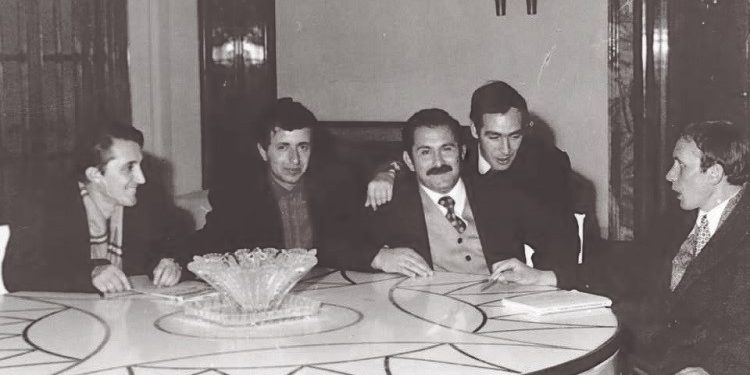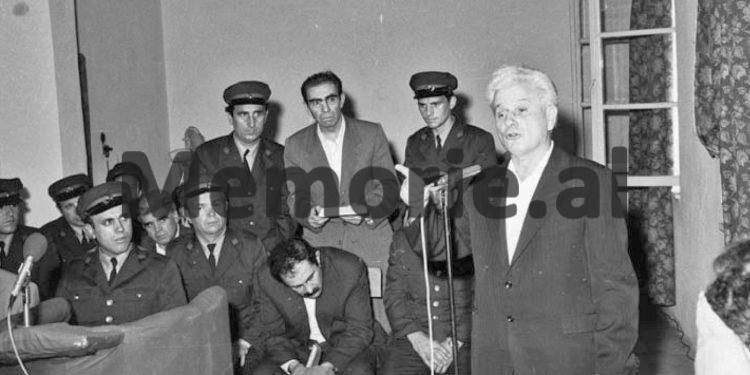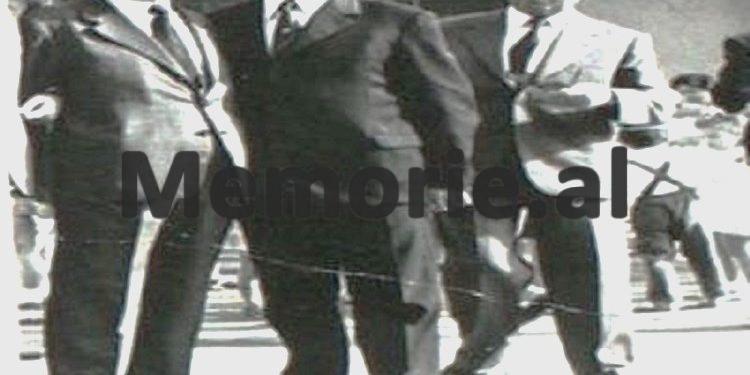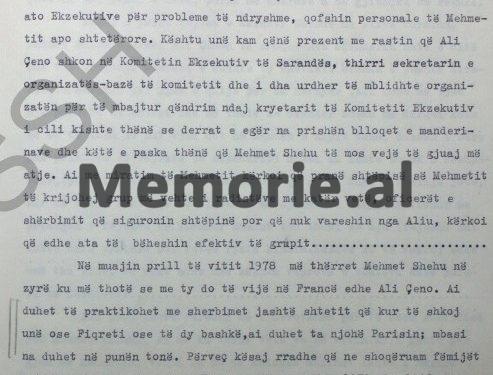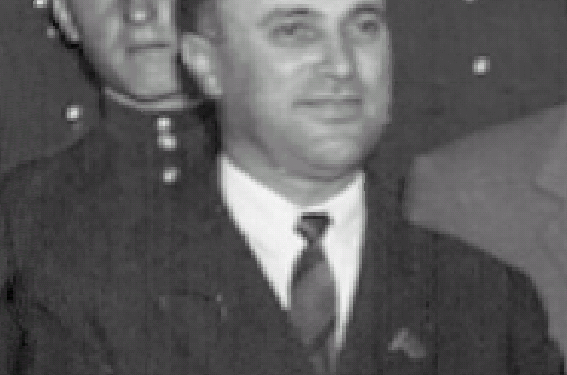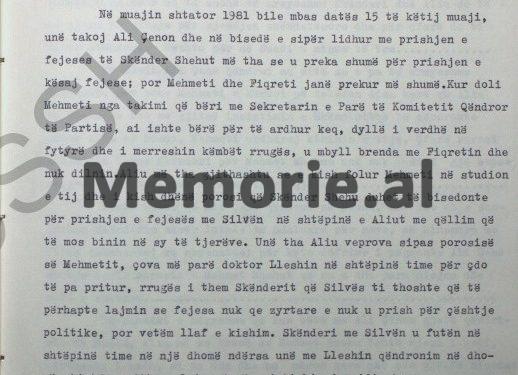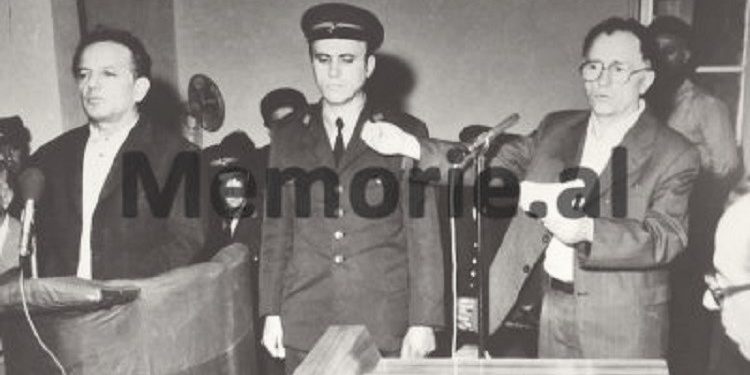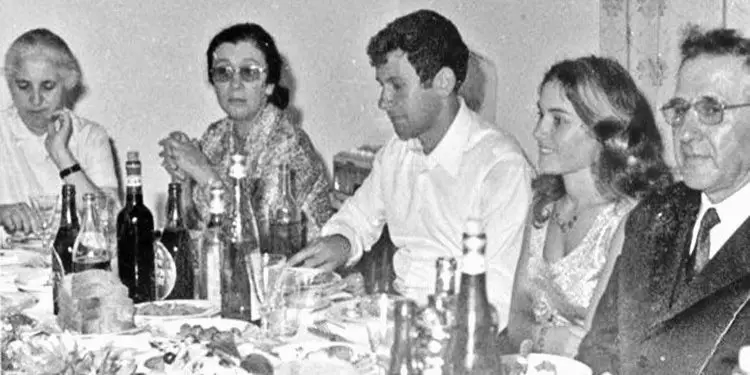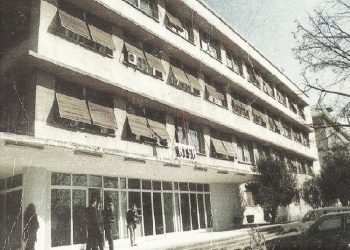By Dashnor Kaloçi
Part thirty-four
Memorie.al / Forty-three years ago, at dawn on December 18, 1981, the Albanian Prime Minister Mehmet Shehu, who had held that position since 1953, was found dead in his bedroom (according to the official version, from a “pistol shot”), in the villa where he lived with his family, at the entrance to the “Block” of the high leadership of the Party of Labour, just a few meters from the building of the Central Committee of the Party of Labour and also from the villa of Enver Hoxha, number 31. Even though more than four decades have passed since that day, considered one of the most serious and also most publicized events of that regime, there is still no clear and accurate version regarding what happened to the former Albanian Prime Minister, Mehmet Shehu, on the night before December 18, 1981! However, even after the 1990s, dozens of testimonies and archival documents have been made public regarding that event, “the murder or suicide of Mehmet Shehu,” which continues to be the subject of numerous debates and discussions, further shrouding the truth around it in mystery!
Starting from this fact, in the context of publishing dozens of testimonies and files with archival documents from the secret fund of the former State Security and the Ministry of Internal Affairs, or even the Central Committee of the Party of Labour, which we have published in these three decades after the collapse of Enver Hoxha’s communist regime and that of his successor, Ramiz Alia, Memorie.al has obtained the voluminous file “of the enemy and poly-agent Mehmet Shehu,” which was extracted from the secret fund of the former State Security at the Ministry of Internal Affairs (now declassified and part of the fund of the Authority for the Information of the Documents of the former State Security), where with a few small exceptions, the vast majority of them has never seen the light of publication and is being published for the first time complete with the relevant facsimiles.
In this file, in addition to the testimonies in interrogation from witnesses or defendants, there are also complete the expert reports of the operational-investigative group that was established immediately on the morning of December 18, 1981, led by Koço Josifi (head of the Investigation Directorate of the Ministry of Internal Affairs of Tirana), forensic doctors Dr. Fatos Hartito and Docent Bashkim Çuberi, the Prime Minister’s doctors, Milto Kostaqi and Llesh Rroku, the criminalist expert from the Central Forensic Laboratory of the Ministry of Internal Affairs, Estref Myftari, assisted by high officials from that ministry, Deputy Minister Xhule Çiraku, head of the Investigation Directorate at the Ministry of Internal Affairs Elham Gjika, and the deputy director of the Tirana Directorate of Internal Affairs, Lahedin Bardhi.
This file also contains the testimonies of the family members of the former Prime Minister Mehmet Shehu, service personnel, and his escort group, as well as all the other people who were summoned and testified about that event.
However, even though we are dealing with archival documents, it should be emphasized that knowing how the communist regime operated before the 1990s, we cannot claim absolute truthfulness regarding what is written there, as not only the witnesses and defendants who have given their testimonies, but also some of the investigators of this case (primarily after the 1990s) have made it known that these were obtained under pressure, intimidation, and torture, both physical and psychological, even further, where some of the investigators wrote them themselves, and the witnesses or defendants simply signed them.
Moreover, for some of the defendants in this investigative process, specifically in the case of Fiqret Shehu, the questions were drafted by Enver Hoxha himself (in his handwriting) and were sent to the investigators through the Minister of Internal Affairs, Hekuran Isai (which we have published with the relevant facsimiles in previous writings), and all of this aimed to enable “the discovery of the hostile group of poly-agent Mehmet Shehu,” in order to justify his suicide (according to the official version)!
In this context of the dictator Enver Hoxha’s paranoia, the following individuals were arrested and placed on trial: Kadri Hazbiu (former member of the Political Bureau of the Central Committee of the Party of Labour and Minister of Internal Affairs and Defence), Feçor Shehu (former Director of State Security and Minister of Internal Affairs), Nesi Nase (former Minister of Foreign Affairs), Llambi Ziçishti (former Minister of Health), Llambi Peçini (former head of the Directorate of Protection and Physical Security of the high leadership of the Party of Labour), Elham Gjika (former head of the Investigations of the Ministry of Internal Affairs), Gani Kodra (former head of the Directorate of Protection and Physical Security of the high leadership of the Party of Labour and the family of Mehmet Shehu), Kristofor Martiro (former investigator of the “hostile group of Beqir Balluku”), Ali Çeno (former head of the escort group of Prime Minister Mehmet Shehu), Xhavit Ismailaga (former barber of Hotel “Dajti”), Idriz Seiti (former Colonel of State Security, head of the Departments of Internal Affairs in Kukës and Lezhë, and head of department in the Ministry of Internal Affairs for the protection, security, and execution of anti-party individuals), Lirim Pëllumbi (former head of the Department of Internal Affairs for the district of Durrës), Qamil Mane Islami (former Colonel in the Directorate of Camps and Prisons of the Ministry of Internal Affairs), Duro Shehu (brother of Mehmet Shehu, former commissioner in the Directorate of Military Aviation of the Ministry of Defence), Fiqret Shehu, the wife of Mehmet Shehu, along with their two sons, Bashkimi and Skënderi, etc.
From this “hostile group,” the first four (Kadri Hazbiu, Feçor Shehu, Llambi Ziçishti, and Llambi Peçini) were sentenced to death and executed, while the others received heavy prison sentences, from which they were only released in 1991, with the exception of Fiqret Shehu, who died in prison in 1987, under mysterious and still unresolved circumstances, as well as the eldest son of the Shehu family, Vladimir, who also died under mysterious circumstances still unresolved, in the city of Gramsh (the official version: suicide), where he had been interned with his family in January 1982. For more information about this event, etc., the documents in question provide details, which we are publishing along with the relevant facsimiles and photos.
Continued from the previous issue
MINUTES OF THE INTERROGATION OF GANI KODRA, FORMER CHAIRMAN OF THE DEPARTMENT OF MAINTENANCE AND PHYSICAL SECURITY OF THE HIGH LEADERSHIP OF THE PPSH AND LATER OF MEHMET SHEHU’S FAMILY, BY THE INVESTIGATORS OF THE MINISTRY OF INTERNAL AFFAIRS, LUAN BEGA AND SKËNDER MYFTARI
MINUTES
Testimony
Tirana, on September 23, 1982
We, Luan Bega and Skënder Myftari, investigators at the Ministry of Internal Affairs, interrogated the defendant Gani Kodra.
The investigators warned me about my criminal responsibility in case of false testimony, based on Article 202 of the Penal Code of the People’s Republic of Albania.
Question: Defendant, explain to us what other hostile actions you have undertaken against the Party and the people’s power, in favor of the hostile group led by the traitor Mehmet Shehu?
Answer: As I have explained previously in my interrogations, by entering the hostile path led by Mehmet Shehu, since the 1950s up to the day of my arrest, I have tried fanatically to carry out the tasks and orders given by Llambi Peçini, who was the first to manipulate me and put me on the hostile path against the Party and the people as well as those given to me by Mehmet Shehu himself, who led this group.
I knew that, apart from myself, Llambi Peçini and Llambi Ziçishti, Feçor Shehu, Skënder and Fiqreti Shehu, the hostile activities of this group also involved Ali Çeno, the former personal escort and responsible for the escort group of Mehmet Shehu. Regarding his hostile activity, I can explain as follows:
I got to know Ali Çeno closely from the beginning of 1973, when he came to the Second Directorate, in the group of escorts. When I returned from Paris, where I was on duty escorting Mehmet Shehu, who underwent surgery that year, Llambi Peçini was the director of the Second Directorate. He explained to me, among other things, about Ali Çeno’s arrival in this Directorate.
Llambi explained to me that Ali Çeno had come to this Directorate at Mehmet Shehu’s request, after being recommended by Petrit Dume himself, who was also involved with Ali’s wife. Llambi told me that I had not known this person before, as he had been in the army and, as such, was not well-versed in the affairs of Security. Therefore, Llambi went to Mehmet himself to discuss it.
After Llambi explained to Mehmet Shehu that since Ali did not understand the affairs of Security, and because of this, it would be better to keep him in the group as an escort, Mehmet said that not only should Ali stay in the group as an escort, but he should immediately become the head of the group, because he was exactly the person he needed, while for the rest, he would learn himself. Faced with this order, Llambi Peçini immediately appointed him head of the escort group for Mehmet Shehu, and he held this position until the moment he committed suicide.
During the eight years I served in the Second Directorate, especially tasked with guarding and escorting Mehmet Shehu and his family members, both here in Albania and abroad, such as in France, and especially Skënder Shehu in Sweden, I witnessed with my own eyes the loyalty of Ali Çeno to Mehmet Shehu and his family, as well as the love and special respect that Mehmet had for him, but also Fiqreti and the children had for Ali Çeno.
I say this because when Ali became the head of the group, Mehmet kept him very close, talking to him as if they had known each other for a long time, they would walk together, conversing so warmly that it caught everyone’s attention, because Mehmet had not done these things with any other head of the escort group he had had before.
For a short period, Ali became the person who gave orders and instructions in Mehmet’s name and began making requests for an increase in the number of escorts, service vehicles, household guards, and allowed the use of vehicles for the family members of Mehmet, without any limits or criteria.
He started selecting the people he wanted for the escort group and began to impose his authority there, after Mehmet and Fiqreti. By Mehmet’s orders, he sent orders to the Party Committees and to the Executive Committees on various issues, whether they were personal matters of Mehmet or state matters.
Thus, I was present when Ali Çeno went to the Executive Committee of Saranda, summoned the secretary of the basic organization of the committee, and ordered him to gather the basic organization to take a position against the chairman of the Executive Committee, who had said that wild boars were destroying our mandarin blocks, and this was supposedly said so that Mehmet Shehu would not go hunting there.
With Mehmet’s approval, he requested that next to Mehmet’s house, a separate group of guards of four people be created, who were security officers guarding the house, but who were not under Ali’s supervision; he requested that they also become part of the group.
In April-May 1978, Mehmet Shehu called me to his office and told me that, “I will go to France and Ali Çeno. He needs to be trained for service abroad, so that when I go or Fiqreti goes, or both of us together, he must know Paris, as we need it for our work.”
In addition to this time when we accompanied his children, Ali also went to France in 1978 and 1980 to escort the children of Mehmet Shehu and their wives, and he made numerous expenses in France and other cities in Europe, where they took tourist trips.
As I explained earlier, in 1980, at the order of Mehmet Shehu, Skënder Shehu and I went to Paris. Upon arriving in Paris, we met Bashkim Shehu with his wife and Ali Çeno, who were waiting for us. Ali Çeno handed Skënder Shehu a letter, saying, “Mehmet Shehu gave this to me for you to hand over.”
Skënder took the letter and read it when we arrived at the Reception House, but he did not tell us what instructions Mehmet had given him. When we landed in Stockholm, Skënder Shehu called Mehmet and informed him that he had received the letter that you sent with Ali and that everything was fine with what he wrote.
After Skënder Shehu’s engagement to Silva Turdiu was broken off, Mehmet Shehu tasked Ali Çeno to accompany Skënder day and night and to create opportunities and conditions for him to travel within and outside of Tirana, to go hunting and shooting, for his amusement. One afternoon, Ali came to my house and told me that Skënder Shehu had sent him here to say that he cannot attend your nephew’s wedding (the wedding I held after Skënder’s engagement was broken), as he was very upset, but he (Skënder) asked me to convey that, “you Gani and your family, when the opportunity arises to talk with different people regarding the breaking off of Skënder Shehu’s engagement, should tell them that it was not formalized, but just words we had!”
“I will also act this way,” said Ali. In fact, I also proceeded this way and carried out Skënder’s order. In September 1981, after the 15th of that month, I met Ali Çeno and in our conversation regarding the breakup of Skënder Shehu’s engagement, he told me that he was very affected by the breaking off of this engagement; however, Mehmet and Fiqreti were affected even more.
When Mehmet came out of a meeting he had with the First Secretary of the Central Committee of the Party, he looked terrible, with a yellow wax-like face and was staggering as he walked; he locked himself inside with Fiqreti, and they did not come out.
Ali also told me how he spoke with Mehmet in his studio and told him that Skënder Shehu should discuss the breakup of the engagement with Silva Turdiu at Ali’s house, to avoid drawing the attention of others.
“I—Ali said—acted according to Mehmet’s instructions, I first sent Doctor Lleshi to my house, just in case. On the way, I told Skënder that he should tell Silva to spread the news that the engagement was not official and was not broken off for political reasons, but just talk we had. Skënder and Silva went into my house into a room with Silva, while I stayed with Lleshi in the other adjacent room for 3-4 hours while their discussion lasted.”
I remember that one or two days before I was to leave for Sweden with Skënder Shehu, Mehmet Shehu called me into his office and after we greeted each other, he said that, “with you (me and Skënder), Ali Çeno will also come to Sweden, so that Skënder doesn’t get bored.”
I told Mehmet that until now he had not expressed any dissatisfaction with me, as he had never mentioned anything of the sort. Mehmet told me that Skënder had no complaints against me, nor did he; in fact, he was very pleased with my work, as I had carried out the tasks, he had assigned to me and those given by Skënder. But he said that Ali would come to Sweden and would stay as long as Skënder deemed it necessary, as Skënder and Ali would update him on the health situation and what Skënder would tell him.
Thus, the three of us set off for Sweden. During the various conversations I had with Ali Çeno during our stay in Sweden, Ali told me that Mehmet Shehu was a capable man, a great leader, who cared for us and protected us in every way.
In conversations I had with Mehmet, Ali said that even about you, Gani, he spoke well of you as a capable person with character, discreet and loyal, as he would say, throughout the time, following my orders and instructions with fidelity.
I (Gani) also told Ali that Mehmet had affection for him, and he told me that he had found in you the most adaptable and loyal person to him. After returning from Sweden, when Mehmet Shehu committed suicide, I met Ali Çeno, who was very upset; he told me that the night Mehmet Shehu left the meeting of the Political Bureau, he was very upset and spiritually distressed, went home, and did not come out again.
For two days before his suicide, he had been in this state, which is why I stayed night and day there to help him with anything he needed. In the morning, we found him dead by suicide, and when I saw him, I cried; he had left a letter that we submitted.
Ali, as Mehmet Shehu’s most trusted man, was the only person from the group accompanying him, whom Mehmet always took with him when he went to the most secret places in the army. To the arms depots, factories, tunnels, and other secret locations. Ali and I have made significant illegal expenses in escorting the family of Mehmet Shehu, whenever he traveled to France and when he went to Sweden.
These are the things I remember now about the hostile activities that Ali Çeno carried out, both alone and in collaboration with me in favor of the hostile group led by the traitor Mehmet Shehu, against the Party and the people.
I am able to tell Ali to his face or in court if necessary; I do not add anything against him; I have had a good relationship with him and have never had any quarrels. We both worked to serve the treasonous work of Mehmet Shehu with a clear conscience.
I wrote this process myself by hand and signed it without any remarks./Memorie.al
The defendant Investigators
Gani Kodra Skënder Myftari Luan Bega
Continues next issue




